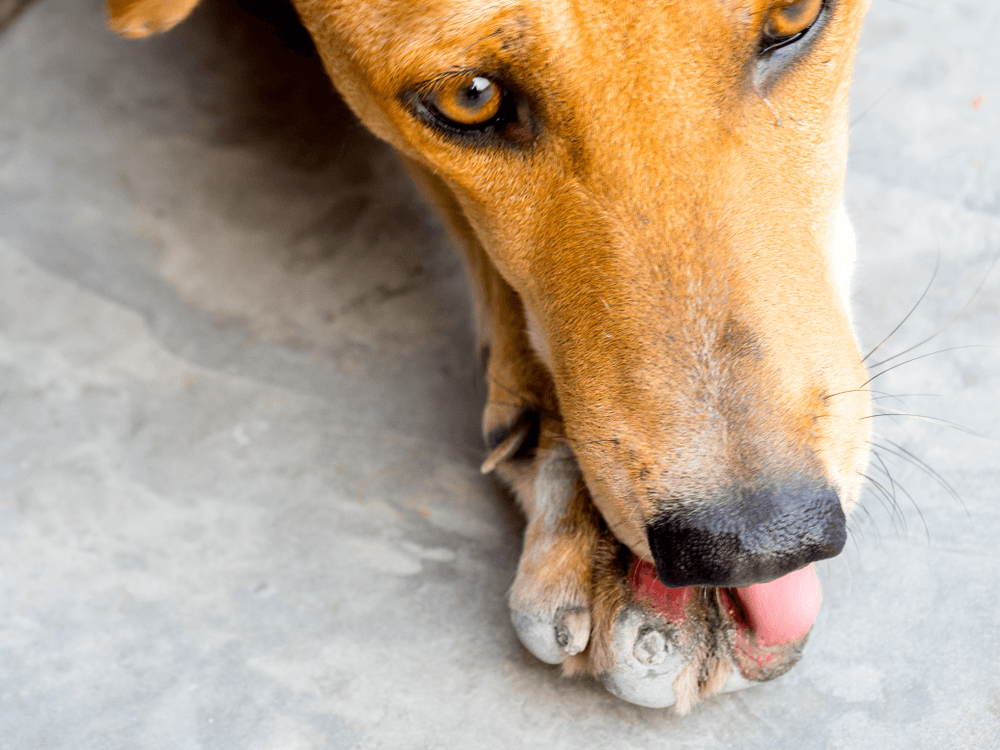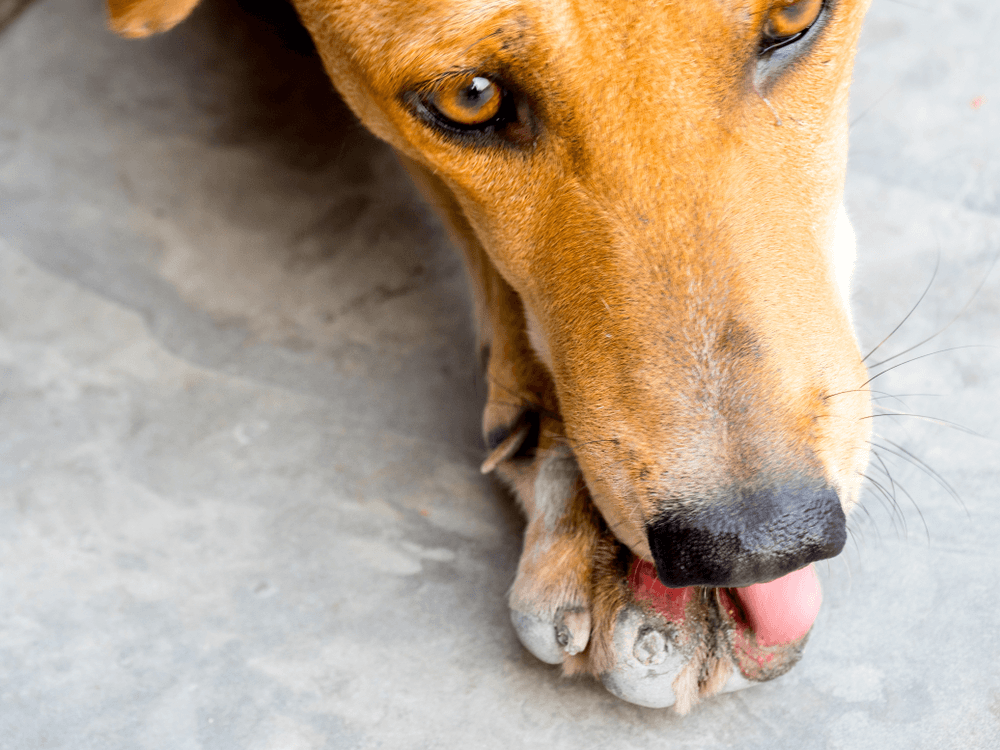Canines like licking. They get pleasure from licking themselves, folks and objects. However generally a canine licking consistently is their means of telling us that one thing is bothering them.
HOW TO SPOT IT: Why do canine lick?
For a canine, licking is a type of communication. “Canines use physique language and gestures reminiscent of licking to convey details about their emotions and intent,” says Ruth Hegarty, M.S.E., licensed canine coach and conduct marketing consultant. “Canines licking one another often have an affectionate intent. It may be a type of grooming which they’ll do with canine they really feel near.”
Canine mothers will lick their newly born puppies to wash them and to get them to start respiratory. Puppies might lick their mother to get her to regurgitate meals. In different instances, some canine will lick their very own faces to appease one other canine, basically saying “I’m not a risk.” Whereas canine licking behaviors are essential and pure amongst the pack, it might grow to be extreme and an indication of tension in some home canine.
Being bored, confused, in ache or itchy might trigger canine to excessively lick. “If a canine is obsessively licking a spot on their physique it may be an indication of discomfort, reminiscent of itching or ache,” says Ruth. “This conduct can even embrace biting on the space in addition to licking.”
She suggests a veterinarian be consulted in these instances. Different potential alerts of ache and itching might embrace licking of the paws. Paw-licking might point out a spread of potential medical situations, together with allergic reactions, a wound or perhaps a type of neuropathy.
If painful or itchy situations are dominated out, or your canine is licking one thing else (such as you, the carpet, blankets or different surfaces), it could possibly be boredom or anxiousness. Adjustments in a routine or separation can set off anxious licking and will take some skilled assist to deal with. Nonetheless, generally small changes to your canine’s atmosphere may help.
“Check out how [your dog] spends their day,” suggests Ruth. “Is your canine getting sufficient train? Psychological stimulation?” She suggests including in an additional stroll or play session, contemplating methods to supply extra psychological stimulation and even taking a category collectively to maintain your canine’s mind energetic.
THINGS TO CONSIDER: Might this be compulsive?
For excessive licking, a compulsive dysfunction could also be a consideration. “A conduct that’s tough to interrupt could also be extra more likely to be brought on by a medical situation that causes misery than is a conduct that’s simply interrupted,” writes Valarie V. Tynes, DVM, DACVB over at DVM360.
In case your canine is interrupted from licking, she suggests you think about how lengthy it takes them to return to the conduct once more. “A canine that instantly returns to licking after a short interruption could also be in physiologic misery or demonstrating a compulsive dysfunction.”
Speaking to your vet and/or canine conduct marketing consultant will assist you to begin to determine what is going on. To organize for that dialog, you’ll need to begin documenting conduct. Dr. Tynes suggests pondering again to when the issue first started and any adjustments that will have occurred round that point. You’ll additionally need to begin recording when and for the way lengthy your canine licks, and their response in the event you attempt to cease the licking.
FIRST STEPS TO TAKE: Understanding why your canine is licking
There’s a fantastic line between an affectionate kiss-lick and fixed licking of pillows, blankets, your ft and the rest they need to lick! Canines will be telling you a complete host of issues with their licking conduct and step one is attempting to grasp what which may be:
I’m in ache. Something slightly totally different in your canine’s mouth may make them lick or drool. Ache in a joint, pores and skin an infection or nerve points may set off licking, too.
I’m itchy. A bug chunk or allergic reactions can create itchy pores and skin for a canine, which they might take care of by licking as an alternative of scratching in some instances. Nonetheless, beware {that a} easy itch would possibly grow to be one thing extra insidious in some canine. Often called sizzling spots, canine tend to lick some spots uncooked in response to one thing small and itchy—like a scab or bug chunk. Different canine would possibly chew or lick at their tails and hind-quarters when their anal glands are impacted.
My tummy hurts. A research finished on the College of Montreal Veterinary Instructing Hospital examined canine who excessively licked. Of the 19 canine studied, 14 had gastrointestinal abnormalities recognized by an examination, and treating the GI situations resulted in decreased licking in lots of instances.
I’m hungry or thirsty. Licking an empty meals bowl or lips may point out your pup is prepared for his or her subsequent meal or a cool sip of water.
My ft really feel bizarre. Peter Dobias is a veterinarian that takes a holistic method to caring for animals. In his 2014 article within the Modern Veterinary Care Journal, he took a more in-depth have a look at paw lickers. Although paw licking has typically been written off as allergic reactions, it didn’t appear to be the case for all canine. Allergy symptoms or not, they nonetheless licked.
“I began to look nearer on the patterns I used to be seeing, and started inspecting the neck and backbone for discomfort, muscle spasm, irritation and tightness,” Dr. Dobias writes. He found that entrance paw lickers are inclined to have discomfort of their neck whereas again paw lickers have points of their lumbar backbone.
I’m getting older. Older canine might develop cognitive dysfunction, a situation related to many repetitive behaviors, together with licking. In keeping with DVM360, “Canines with cognitive dysfunction might show quite a lot of repetitive behaviors. But when the extreme licking conduct is a results of cognitive dysfunction, then therapy might be totally different than it’s in canine with out cognitive impairment.”
I’m feeling compelled. As mentioned above, some canine will develop a compulsion to lick.
For those who’re undecided what’s inflicting your canine’s licking, or if it turns into fixed, it’s in all probability finest to get to the basis of it earlier than it turns into a behavior and tougher to cease.

HOW TO GET HELP: Inquiries to ask veterinary and conduct professionals
In case your canine is licking greater than regular, your first step is to contact your veterinarian. Fixed licking could be a signal of an underlying medical concern that you just’ll need to rule out BEFORE consulting a conduct skilled. For those who’ve begun recording the licking situations, deliver your log with you to have a extra detailed dialog.
,

